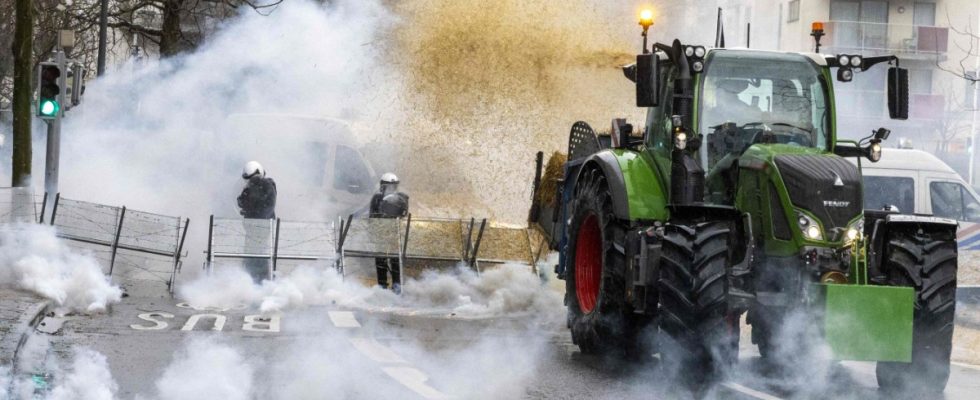In order to accommodate the protesting farmers, the EU Commission wants to urgently defuse the eco-rules of European agricultural policy. The authority led by Ursula von der Leyen has drawn up several changes to the law, which are expected to be presented this Friday and passed before the European elections at the beginning of June. The overarching message: less coercion and less bureaucracy, instead more voluntariness.
Under the impression of massive farmers’ protests in Brussels, the agriculture ministers of the 27 member states called on the Commission at the end of February to bring relief for farmers. The legal changes that are now on the table are of a fundamental nature. They concern the Common Agricultural Policy (CAP), i.e. the basis of agricultural subsidies from the European Union budget. For the funding period until 2027, the eco-regulations were tightened in order to stop the extinction of species and combat climate change. The Commission is now suggesting that essential parts of it be changed.
The most controversial issue among German farmers is the obligation not to cultivate four percent of their land. This obligation has recently been suspended several times – for example in order to increase Europe’s grain yields in view of the war in Ukraine. The federal government only recently overturned the requirement for the current year. After she canceled agricultural diesel subsidies for farmers, this should calm people down a bit.
Anyone who voluntarily sets aside land receives money from the first hectare
Now the obligation should be dropped completely. If farmers still set aside land, this should be rewarded from the first hectare in the future. Until now, this funding in Germany was only available for areas that remained unused beyond four percent. The fallow land should be given at least some refuge for animals and plants, especially in intensively used regions.
To date, the CAP also contains detailed regulations on crop rotation, i.e. the annual change of the main crop on a specific arable land. This is intended to benefit the soil – but will also be handled less strictly in the future. In general, member states should be able to interpret the rules more freely in the future than before. The Commission’s proposals also contain a special signal to smaller companies: those who farm less than ten hectares should no longer be checked to see whether they are actually complying with the organic rules. To justify its proposals, the Commission explicitly mentions the farmers’ protests, which demanded an appropriate, rapid response. The aim is to free farmers from bureaucracy and provide them with additional income.
The CDU politician Norbert Lins, chairman of the Agriculture Committee in the European Parliament, expressly supports the proposals. The Commission obviously takes farmers’ concerns seriously, he said South German newspaper. He is now calling on the Green Federal Agriculture Minister Cem Özdemir to accompany the reforms “constructively instead of destructively as has been the case so far” so that the legislative process can be completed quickly. There isn’t much time left until the end of the legislative period. The member states and Parliament would have to reach an agreement with the Commission by the end of April.
A spokesman for the German Ministry of Agriculture did not want to comment on the move on Thursday. Until now, however, the ministry had always emphasized how important ecological services were in agriculture – and had also made proposals for financing them. The idea from Brussels is unlikely to be in line with Green Agriculture Minister Cem Özdemir. The Green MEP Martin Häusling even speaks of a “catalog of horrors”. Fallow land would be sacrificed and grassland protection would be weakened. As a result, biological diversity in Europe and ultimately climate protection would suffer.
Farmers are also divided. The farmers’ association welcomed the move. “The proposed flexibilization opens up the opportunity for our farmers to be more competitive,” said Secretary General Bernhard Krüsken. However, further relief is expected. The smaller working group for rural agriculture, on the other hand, warned of disadvantages. “The indirectly targeted increase in production ultimately benefits the agricultural and food industry in particular because it depresses producer prices,” said agricultural policy expert Ottmar Ilchmann. The abandonment of nature conservation will also “cost us farmers dearly sooner or later.”

